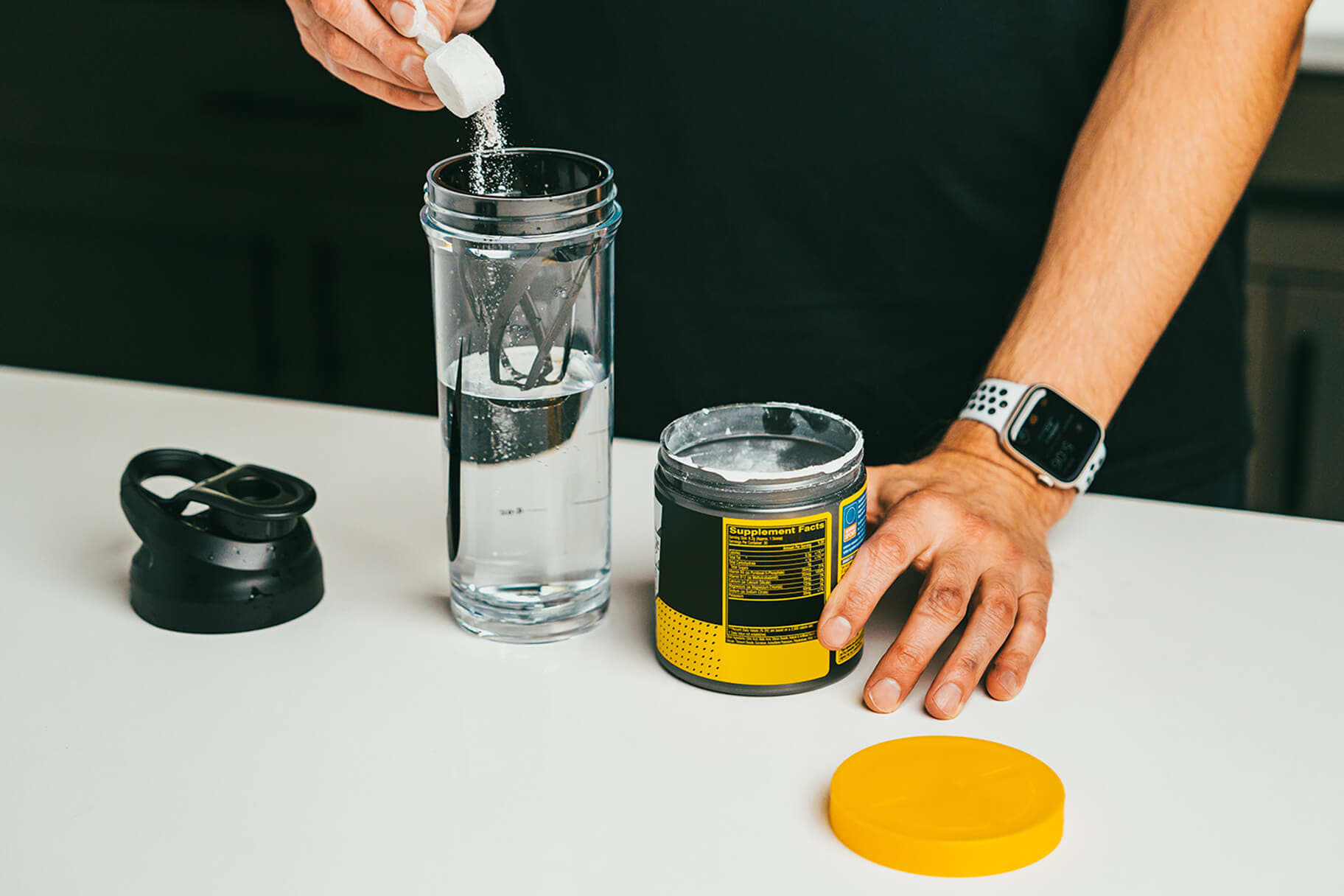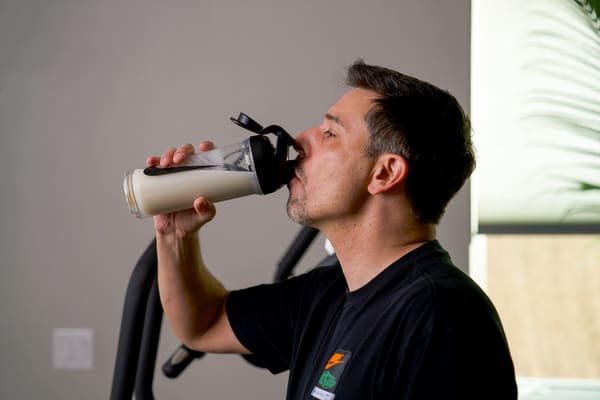Does Creatine Help Build Muscle? Experts Explain
Nutrition
Does this common strength-training supplement live up to the hype? Here's what nutrition experts have to say.

When it comes to building muscle, here's the hard truth: there are no magic shortcuts. You have to put in the work.
However, while workouts won't complete themselves, nutrition and other methods can foster fitness gains. Proper fuel and hydration, for example, can offer a host of benefits for muscle growth, recovery and even for enhancing sleep quality. But what about supplements, like creatine? Does creatine help build muscle?
Here, nutrition experts explain what's science and what's marketing.
What Is Creatine?
Creatine is a natural compound, also known as an amino acid, produced in our kidneys, liver and pancreas. However, it's primarily found in skeletal muscle (the voluntary muscles responsible for carrying out exercise and daily activities), according to Lenka Shriver, PhD, nutrition researcher and professor in the nutrition department at University of North Carolina, Greensboro.
When the muscles contract, the amino acid plays a role in energy production. It's also key for replenishing energy after brief rounds of maximum-effort exercise, such as weightlifting and sprinting.
(Related: Can Weightlifting Stunt Growth? Experts Explain)
"Although about one gram of creatine is synthesised in the body daily, it can also be consumed from external sources through your diet", she said. "That means the level of creatine differs among individuals based on their dietary intake".
Because it's primarily found in meat and fish, creatinine levels tend to be higher in people who eat animal products than those who follow a vegetarian or vegan eating plan, she said.
It's also available as a supplement and the most common form of that is creatine monohydrate powder. Shriver said this is also the most studied form. In other words, if you're looking at research about creatine and supplementation, it's probably about creatine monohydrate.
How Does Creatine Help Build Muscle?
Consuming creatine supplements either pre-workout or post-workout is believed to "lock in" your muscle gains more effectively, which means if you're doing strength training, you can boost efficiency with this type of supplement.
The way it works: creatine helps make more adenosine triphosphate, or ATP, which is what cells use for energy and what muscles utilise for contraction. The body doesn't store much ATP and when it's depleted, it takes time to build back up. Creatine is like a shortcut that boosts ATP without that lag time.
Having a sufficient level of creatine available in the contracting muscle is associated with better efficacy of replenishing the type of energy the muscles need while they're working, Shriver said.
"By using a creatine supplement, it is possible to increase your creatine levels in the muscle by anywhere between 20 to 40 percent", she said.
By itself, that doesn't cause muscles to bulk up, but it's the effect that can lead to muscle gain, according to Shriver. With more energy, or ATP, in the muscles, they take longer to fatigue—and that means you can usually increase the number of reps during a resistance-training exercise, lift heavier weights, or both. If you're doing interval workouts like HIIT, you might find that you can put in more work at a higher intensity. You won't catapult yourself to superhero energy, Shriver said, but it can provide enough of a burst to improve performance in what you're doing.
"With this capability, you can improve muscle mass, muscle strength and performance over time", Shriver said.
Common Mistakes With Choosing (and Using) Creatine
Searching for "creatine supplements" on the internet results in a breadth of product options, mainly for powders and capsules. Some creatine is bundled with other ingredients and promoted as a post-workout booster, while others boast a single-ingredient option of only creatine. How do you pick?
1.Not Making Sure the Product Is Safe to Use
"One of the most common missteps in terms of choosing creatine is purchasing products that are not certified by a third party to make sure it's safe to use and there are no illegal or banned substances in the product", said Ashley Harpst, RD.
She added that, for the US, she recommends products marked as NSF Certified for Sport—especially if you compete regularly in events where substance testing is done.
2.Taking Higher Doses Thinking It Will Lead to More Gains
Even if you get a certified brand, another challenge could be that you take the recommended dosage and then see no difference. Shriver said this is because some people are "non-responders", which means that regardless of the dose used, they may not observe any changes in their strength, power or performance.
This is more likely if you already have naturally high creatine levels in your body, she said—it's those with lower levels who tend to get the most benefits. If you've tried creatine for a month and feel it didn't lead to any results, she said it's better to discontinue use than to attempt taking a higher dose in the hope that this will do the trick.
3.Using Creatine Without Strength Training
Another potential misstep is taking creatine but not training, Hnatiuk said. The compound itself doesn't provide benefits—it just increases energy production in your muscles. But if you don't follow the compound with training, then you squander the opportunity to use that energy for building strength and performance.
"You do need to actually do the work to increase power, strength and muscle size", she said.
Tips for Using Creatine Supplementation
There are two ways you can start using a creatine supplement to maximise its availability in the muscles, Shriver said. Both approaches have to do with the dose you take initially and then over time. However, make sure you consult your doctor or related health professional before starting any new dietary supplements.
- Option one: take 2 to 5 grams per day for four weeks.
- Option two: do a loading dose of 20 grams per day for five days—split into four doses of 5 grams throughout the day instead of all at once. Then, for the following three weeks and two days, switch to 2 to 5 grams per day.
Both options have been shown to saturate skeletal muscle with creatine, Shriver said, so it's mainly a matter of preference. For some people, having that initial loading dose helps them feel a sense of getting a jump start. For others, they prefer the slow-and-steady dose of option one.
Not sure which to pick? Try one and then the other, with a "washout period" of seven to 14 days between. Also, make sure you're taking a washout period between each four-week session.
That allows the extra creatine to be flushed from the muscles and for your creatine levels to go back to baseline. Restarting a new four-week session of creatine supplementation can then create larger improvements in peak power and lifting volume, Shriver said.
When Is the Best Time to Take Creatine?
Since creatine provides energy when you engage in high-intensity activity, the best time to take a creatine supplement is shortly before or after exercise, said Stephanie Hnatiuk, RD, who specialises in sport performance. The one exception is if you're following the "loading" strategy and spacing out doses throughout the day.
"Another little-known fact about creatine is that it's more easily dissolved in hot beverages compared to cold ones", she said. "One of the common complaints about creatine powders can be their grainy texture, so mixing [it] into a warm drink like coffee or tea improves its solubility".
Make sure you pair the creatine with a source of carbohydrates, she said, because this aids absorption. And because creatine tends to pull water into your muscle cells—some people call it "locking water in"—it's especially key to hydrate more than usual to counterbalance that effect, since the rest of your body needs hydration, too.
Words by Elizabeth Millard, ACE CPT.





